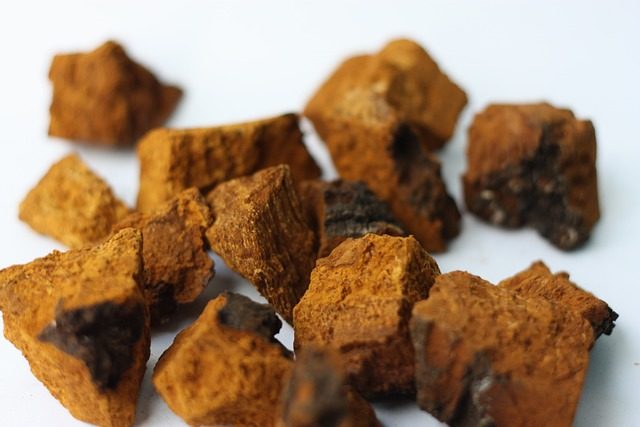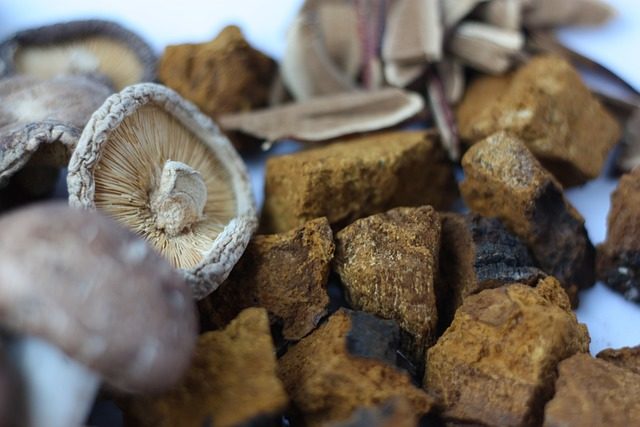Have you ever heard of a superfood that not only boasts a rich history in traditional medicine but also has potential health benefits backed by modern science? Enter the world of Chaga mushroom! In this blog post, we’ll uncover the secrets of these powerful fungi, from their origin and appearance to their impressive nutritional profile and potential health benefits. Are you ready to embark on a journey of discovery with Chaga mushroom? Let’s dive in!
Table of Contents
Key Takeaways
Chaga mushrooms have been used in folk medicine for centuries and are a nutritious, low-calorie superfood with high antioxidant content.
Research suggests they may offer potential health benefits such as immune system support, anti-inflammatory properties and possible anticancer effects.
Consult a healthcare professional before consumption due to potential risks and drug interactions.
Unveiling the Chaga Mushroom

Chaga mushrooms (Inonotus obliquus) have been used for centuries in folk medicine, addressing a range of ailments such as digestive complaints, skin conditions, and even cancer. These medicinal mushrooms are typically found growing on birch trees in cold climates across the northern hemisphere, including Canada, Siberia, Scandinavia, and certain areas of Europe and Asia.
Venturing into the realm of chaga mushrooms, we will discover their distinctive qualities and historical uses, distinguishing them from other species.
Origin and Habitat
Chaga mushrooms are predominantly found in countries such as:
Finland
Russia
Kazakhstan
South Korea
Belarus
Poland
They grow on birch trees, as well as other tree varieties such as ash, elm, beech, alder, and hornbeam.
The rate at which chaga mushrooms grow is relatively slow and it varies depending on the forest and environmental factors. Their preference for cold climates makes chaga mushrooms a unique and fascinating species.
Physical Appearance
In terms of appearance, chaga mushrooms stand out significantly. They possess a tough, black exterior that resembles burnt charcoal and an irregular shape, appearing as a black, charcoal-like mass on birch trees.
Upon cutting open a chaga mushroom, you’ll find a golden-orange, cork-like interior, which contrasts beautifully with its dark, scaly surface. This unique appearance further sets chaga mushrooms apart from other fungi.
Traditional Uses in Folk Medicine
Chaga mushrooms have held a significant place in traditional medicine throughout history, especially in Siberia and other Asian regions. They were used to treat various conditions, including:
Lip tumors
Tuberculosis
Liver conditions
Stomach problems, including gastritis and ulcers
This long-standing use in folk medicine is a testament to chaga’s potential health benefits, which we’ll explore in more detail as we delve into its nutritional profile and scientific research.
The Nutritional Profile of Chaga Mushrooms
Chaga mushrooms are renowned for their impressive nutritional profile, which includes being low in calories, high in fiber, and rich in antioxidants. These properties make chaga mushrooms a valuable addition to any diet, as they can help to support overall health and well-being.
In this segment, the antioxidant, fiber, and low-calorie contents of chaga mushrooms will be examined, along with an exploration of how these nutrients contribute to their potential health benefits.
Antioxidant Powerhouse
One of the most significant attributes of chaga mushrooms is their abundance of antioxidants, which protect cells from damage caused by free radicals or oxidants. Chaga mushrooms have been found to contain a higher concentration of antioxidants than other superfoods, such as acai berry and blueberries, with an Oxygen Radical Absorbance Capacity (ORAC) value of 146,700.
This impressive antioxidant content underscores the potential health benefits of chaga mushrooms and sets them apart from other fungi.
Dietary Fiber
Chaga mushrooms are also an excellent source of dietary fiber, which is essential for maintaining a healthy digestive system. The fiber found in chaga mushrooms, particularly beta-glucans, has been shown to promote the growth of beneficial bacteria, reduce inflammation in the gut, and stimulate the production of digestive bile.
Adding chaga mushrooms to your diet can be beneficial for digestive health and allow you to experience the advantages of this high-fiber superfood.
Low-Calorie Superfood
In addition to their antioxidant and fiber content, chaga mushrooms have the following benefits:
Low in calories, with an estimated caloric content of just 30 calories per serving
A healthy addition to any diet
A lower calorie superfood compared to other options
Adding chaga mushrooms to your daily regimen allows you to take advantage of their potential health benefits without the concern of consuming too many calories.
Exploring Chaga Mushroom Health Benefits

As we’ve seen, chaga mushrooms boast a rich history in traditional medicine and an impressive nutritional profile. But what are the potential health benefits associated with chaga mushroom consumption? In this segment, we’ll examine various health benefits such as:
Support for the immune system
Anti-inflammatory properties
Blood sugar regulation
Potential anticancer abilities
Boosting Immune System
Chaga mushrooms have been shown to support the immune system by promoting the production of beneficial cytokines and fighting harmful bacteria and viruses. In fact, studies have shown that chaga mushrooms can enhance immune function by increasing cytokine production, which aids in cell-to-cell communication and supports the body’s defense against various illnesses.
Adding chaga mushrooms to your diet can help bolster your immune system, aiding in maintaining good health and resilience.
Anti-Inflammatory Properties
Inflammation is a natural response to injury or infection, but chronic inflammation can be harmful to our bodies and may contribute to autoimmune diseases. Chaga mushrooms contain phenolic compounds that demonstrate anti-inflammatory properties, which can help protect cells from inflammation and its damaging effects.
Adding chaga mushrooms to your diet allows you to leverage their anti-inflammatory properties and promote overall health.
Regulating Blood Sugar Levels
Chaga mushrooms have been shown to help regulate blood sugar levels, as seen in animal studies. Their hypoglycemic effects can be particularly beneficial for individuals with diabetes, as they can help reduce blood sugar levels and improve insulin sensitivity. However, it’s important to note that chaga mushrooms should not be used as a substitute for medical treatment or insulin therapy.
If you have diabetes, it’s recommended to consult with a healthcare professional before introducing chaga mushrooms into your diet.
Potential Cancer-Fighting Abilities
Chaga mushrooms have demonstrated potential cancer-fighting abilities in animal and test-tube studies. These studies have shown that chaga mushrooms have cytotoxic effects against several types of cancer cells, including:
Sarcoma
Lung cancer cells
Breast cancer cells
Cervical cancer cells
Additionally, chaga mushrooms have the capability to reduce the growth of lung, breast, and cervical cancer cells in vitro.
While more research is needed to fully understand the potential cancer-fighting abilities of chaga mushrooms, these initial findings are certainly promising.
How to Safely Incorporate Chaga Mushrooms into Your Diet
Now that we’ve explored the potential health benefits of chaga mushrooms, you may be wondering how to safely incorporate them into your diet. In this segment, we will explore various forms of chaga mushrooms like supplements, teas, and extracts, and provide guidance on the precautions and potential interactions to consider when consuming them.
Chaga Supplements
Chaga mushroom supplements are available in various forms, such as tinctures, capsules, tablets, or powders. These supplements can provide a convenient and concentrated source of chaga’s potential health benefits. Some reputable brands of chaga supplements include RealMushrooms, Sayan Siberian, XPRS Nutra, and Om Mushroom.
However, it’s important to consult with a healthcare professional before using any chaga supplements, as they may interact with certain medications or cause side effects.
Chaga Tea and Herbal Teas
Chaga tea is another popular way to incorporate chaga mushrooms into your diet. This herbal tea is made by steeping dried chaga mushrooms in hot water and offers a soothing and less acidic alternative to regular coffee.
To prepare chaga tea, simply:
Add 3 to 5 dried mushrooms or 3.5g of chaga chunks to 1 liter of fresh water.
Simmer on low or warm for up to 12 hours.
The longer you brew the tea, the stronger it will be.
Chaga Extract
Chaga mushroom extract is another way to enjoy the potential health benefits of chaga mushrooms. This concentrated form can be added to recipes or beverages, providing a potent dose of chaga’s beneficial compounds. Chaga extract can be purchased in liquid or powder form and is often used for therapeutic purposes.
As with any supplement, it’s important to consult with a healthcare professional before using chaga extract, especially if you’re taking medications or have any health concerns.
Precautions and Interactions
While chaga mushrooms offer many potential health benefits, it’s important to be aware of potential risks and side effects. Some precautions to consider include avoiding chaga if you have kidney stones, as it may increase the risk of developing kidney stones. Additionally, chaga may interfere with blood-thinning medications and should be avoided by those taking such medications or with bleeding disorders.
As always, it’s best to consult with a healthcare professional before incorporating chaga mushrooms into your diet, especially if you’re taking medications or have any health concerns.
DIY: Making Your Own Chaga Tea at Home
If making chaga tea at home piques your interest, this segment will offer a step-by-step guide to assist you in the process. From choosing the right chaga to mastering the brewing techniques and experimenting with flavor enhancements, you’ll be able to enjoy a soothing cup of chaga tea in no time.
Choosing the Right Chaga
Selecting the best chaga for making tea is crucial for ensuring the highest quality and potency. Factors to consider include:
The source of the chaga: It should be harvested from live birch trees.
The quality and purity of the chaga: Look for chaga mushrooms with a gold or yellow/orange core.
The processing of the chaga: It should be properly dried and processed to maintain its beneficial properties.
Testing for purity: Look for chaga mushrooms that have been tested for purity.
By considering these factors, you can ensure that you are using the best chaga for making tea.
If possible, choose chaga that is certified organic or has undergone third-party testing to guarantee its quality and safety.
Brewing Process
The brewing process for chaga tea is simple and requires only a few steps. Start by grinding the chaga mushrooms into a fine powder using a coffee grinder to ensure optimal extraction of the beneficial compounds during the brewing process.
Next, to make chaga tea, follow these steps:
Add the chaga powder or whole chunks to fresh water.
Simmer on low or warm heat for up to 12 hours. The longer you brew the tea, the stronger and more potent it will be.
Remember to strain the tea before drinking to remove any remaining chaga particles.
Flavor Enhancements
Chaga tea has a unique and robust flavor that can be enhanced by adding various ingredients. Some popular flavorings include:
honey
lemon
ginger
cinnamon
cardamom
cloves
allspice
maple syrup
By experimenting with different flavor combinations, you can create a personalized chaga tea that suits your taste preferences and allows you to enjoy the potential health benefits of this powerful fungus.
The Science Behind Chaga Mushroom: Research and Clinical Trials
Although chaga mushrooms have been used for centuries in traditional medicine, modern science is still working to fully understand their potential health benefits. In this segment, we’ll navigate through the scientific research and clinical trials on chaga mushrooms, encompassing:
Animal studies
In vitro experiments
The ongoing need for more research to comprehensively understand their safety, effectiveness, and appropriate dosage.
Animal Studies
Animal studies on chaga mushrooms have demonstrated significant tumor suppressive effects in tumor-bearing mice, as well as anti-tumor potentials against certain strains of cancer. In addition, animal and in vitro studies have indicated immunity-boosting effects and reduced inflammation with chaga mushrooms.
These findings highlight the promising health benefits chaga mushrooms offer and provide a foundation for further research.
In Vitro Experiments
In vitro experiments on chaga mushrooms have provided valuable insights into their potential cancer-fighting abilities. Studies have shown that chaga mushrooms have cytotoxic effects against several types of cancer cells, including:
Sarcoma
Lung cancer
Breast cancer
Cervical cancer
These studies have also shown that chaga mushrooms have the capability to reduce the growth of these cancer cells in vitro.
These findings support the potential cancer-fighting abilities of chaga mushrooms, which may be linked to their impact on white blood cells, and warrant further investigation.
Call for More Research
While the initial findings on chaga mushrooms are certainly promising, there is still much to learn about their potential health benefits and the appropriate dosage for different individuals. More research is needed to fully understand the safety, efficacy, and appropriate dosage of chaga mushrooms, as well as to explore their potential uses in treating specific conditions and diseases.
By conducting further studies and clinical trials, we can continue to unravel the mysteries of chaga mushrooms and unlock their full potential for human health.
Potential Risks and Side Effects of Chaga Mushroom Consumption
Like any supplement or natural remedy, awareness of potential risks and side effects linked to chaga mushroom consumption is vital. In this section, we’ll discuss the possible concerns related to kidney stones, blood clotting, and drug interactions, ensuring that you can make an informed decision about whether to incorporate chaga mushrooms into your diet.
Kidney Stones
Chaga mushroom consumption has been linked to an increased risk of kidney stones due to its high oxalate content. Oxalates are compounds that can contribute to the formation of calcium oxalate kidney stones, which can be painful and problematic for those affected.
If you have a history of kidney stones or are at risk for developing them, it’s important to be cautious with chaga mushroom consumption and consult with a healthcare professional before adding them to your diet.
Blood Clotting Concerns
Chaga mushrooms may interfere with blood clotting, posing potential risks for those with bleeding disorders or taking blood-thinning medications. The blood-thinning properties of chaga mushrooms can increase the risk of bruising and bleeding, making it important for individuals with these conditions or on blood thinners to exercise caution when consuming chaga.
If you have a bleeding disorder or are taking blood-thinning medications, it’s recommended to consult with a healthcare professional before incorporating chaga mushrooms into your diet.
Drug Interactions
Chaga mushrooms may interact with certain medications, such as those used to treat diabetes or high blood pressure. Chaga mushrooms can reduce blood sugar levels, potentially posing risks for individuals taking insulin or other blood sugar-lowering medications. It’s important to consult with a healthcare professional before incorporating chaga mushrooms into your diet if you’re taking any medications or have any health concerns.
Learn more, visit What Are Chaga Mushrooms and Are They Healthy?.
Summary
In conclusion, chaga mushrooms are a fascinating and potentially beneficial addition to any diet. With their rich history in traditional medicine, impressive nutritional profile, and promising health benefits, chaga mushrooms offer a unique and powerful superfood option. While more research is needed to fully understand their potential, incorporating chaga mushrooms into your diet can provide a natural and delicious way to support overall health. So, why not give chaga mushrooms a try and experience their potential benefits for yourself?
Frequently Asked Questions
What is chaga good for?
Chaga mushrooms are a natural source of antioxidants with potential health benefits such as reducing cholesterol levels, slowing cancer growth, supporting immune function and lowering blood pressure.
What is the main difference between wild harvested chaga mushrooms and cultivated chaga mushrooms?
Wild harvested chaga mushrooms are generally of higher quality and flavor compared to cultivated ones, due to growing in their natural environment and having a long history of traditional use.
How can I safely incorporate chaga mushrooms into my diet?
To safely incorporate chaga mushrooms into your diet, consult with a healthcare professional and consider taking supplements, teas, or extracts.
Are there any potential side effects of consuming chaga mushrooms?
Consuming chaga mushrooms may cause nausea, vomiting, diarrhea and stomach upset. Those with kidney stones or taking blood-thinning medications should exercise caution.
What are some popular flavorings to enhance the taste of chaga tea?
Popular flavorings to enhance the taste of chaga tea include honey, lemon, ginger, cinnamon, cardamom, cloves, allspice, and maple syrup.









